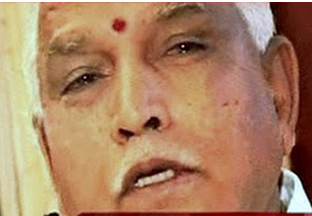Bengaluru, May 2: BJP Karnataka unit President B S Yeddyurappa today became teary-eyed in a CBI court here as he faced a barrage of questions relating to an alleged illegal mining scam case during his chief ministership.
 Yeddyurappa was summoned by the court in connection with the Rs 20 crore donation allegedly received by Prerana Trust, administered by his family.
Yeddyurappa was summoned by the court in connection with the Rs 20 crore donation allegedly received by Prerana Trust, administered by his family.
As many as 475 questions were asked by the judge during the deposition lasting two-and-a-half hours.
The tear-shedding moment came when the judge asked Yeddyurappa if he had something to say on the issue, to which an emotional former chief minister replied, "I have not done anything wrong and whatever I have done, it is done within the parameters of law."
Nor had his acts caused any losses to the state exchequer, he said. Prior to this question also, Yeddyurappa's voice became choked while answering a query whether he was a victim of political conspiracy.
Replying to this, Yeddyurappa, who was recently brought back as the BJP chief, became emotional and his voice turned heavier.
Yeddyurappa, who led the BJP to its first ever government in the south in 2008 elections, had to relinquish the chief minister's post following his indictment by the Lokayukta report on illegal mining submitted on July, 2011 by the then anti-corruption ombudsman Santosh Hegde.
The report had cited receipt of a Rs 10 crore donation from South West Mining Company to the Prerana Trust owned and managed by Yeddyurpapa's family and another Rs 20 crore paid for purchase of 1.02 acres in Rachenahalli by the mining firm.
Hegde in his report had observed that these payments were made to Prerana Trust in anticipation of getting some favours by the mining company, a charge Yeddyurappa had rejected.
CBI had registered an FIR against Yeddyurappa and others, and raided their residential and other premises as part of the probe ordered by the Supreme Court on recommendations of the Central Empowered Committee set up by it to look into illegal mining.





Comments
poor guy...What will happen to him when he was questioned after his death
Yellaaa...IVANA ,,, KALLANA MOSALE KANNEEERU....
Add new comment